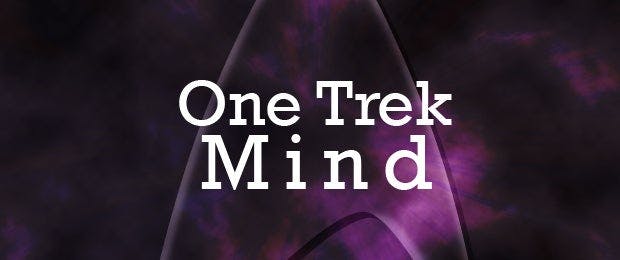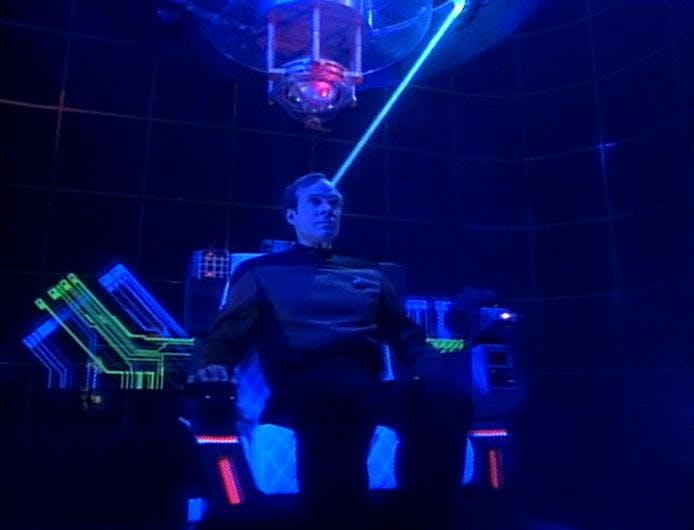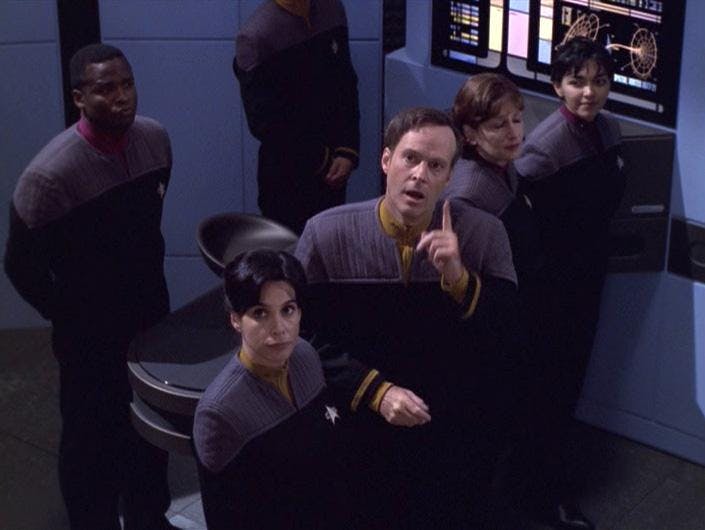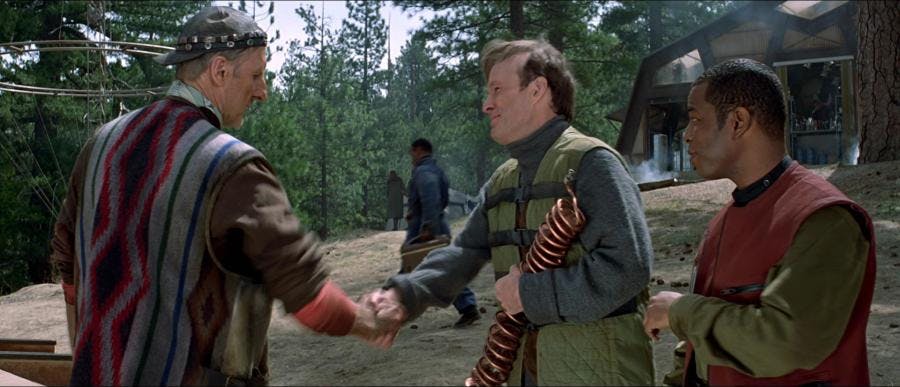
This week is actor Dwight Schultz's 65th birthday. While he may have made his biggest impact as Mad Murdock on four thousand and fifty-two seasons of The A-Team, we Trekkies know a much different side of him.My whole life I've taken whatever Star Trek has offered me, gobbled it with a fork and a spoon and asked for seconds. It took me quite a few viewings before I even considered that Star Trek V: The Final Frontier might be a tiny bit flawed. But in April of 1990, when I was a sophomore in high school and just smart/angry enough to start distrusting people, something didn't sit quite right. I didn't like Star Trek: The Next Generation's Lt. Reginald Barclay.

I didn't yet know the pop culture term “Mary Sue” (a shoe-horned wish fulfillment figure), but I sensed that, in some way, the fantasy-obsessive, nervous man who didn't really belong on the Enterprise was talking down to me. In “Hollow Pursuits,” where we first glimpse Schultz' troubled engineer, it is one of the first times we meet a less-than-perfect crew-member of the Enterprise-D. (Kirk's crew had its share of racists and cowards; see “Balance of Terror” or “The Corbomite Maneuver” for examples.) My teenage eye-rolling was prompted by three distinct thoughts:First, why would Barclay, not just a klutz but a tardy klutz, be allowed on the Federation's flagship, the interstellar beacon of excellence? (Riker floats a theory, that he was simply shuffled off the Zhukov because its Captain Gleason didn't want to bother to deal with the bureaucracy of demotion.) It didn't fly with me, because most of TNG to this point treated the Federation as a working utopia that simply couldn't produce a phobia-ridden individual. Second, I instantly knew that the episode was going to end by, basically, everyone giving Barclay a big hug and letting him feel good about himself. Despite my intense, personal relationship with Counselor Deanna Troi, her mollycoddling side could get a little on my angst-y nerves.Third, whether it was true or not, the whole endeavor seemed like a network exec was making fun of me. By which I mean us – the Star Trek fans. “Oh, those dweebs who never get picked for the soccer team, man, they're gonna' love this guy. A holodeck addiction? He's one of them!” I didn't watch Star Trek to see myself. I watched Star Trek to aspire to great things I couldn't actually achieve in life. Even Wesley Crusher, often mocked, was a kid genius who could save the day with an understanding of science and technology that bordered on magic. (I never disliked Wesley. Well, maybe the rainbow sweater, but that's about it.)
Clearly, my feelings toward Barclay were in the minority. He was brought back four more times on TNG, and was mentioned in passing twice more. He even stayed in Chief O'Brien's mind long enough to get referenced on an episode of DS9 (“Image in the Sand.”)
With enough time and familiarity, of course, Barclay (and Schultz) wore me down and I finally eased up on the guy. Heck, I had to admit that Barclay's Protomophosis Syndrome from “Genesis” was absolutely fantastic. Anything that could cause Worf to de-evolve into a raging beast with a seashell head and grotesque pincers is just a-okay in my book.

With maturity (and the undeniable power of reruns) it grew to a point where I actually got excited when Barclay showed up as a hologram on Voyager (“Projections”). I even cheered with the rest of the audience when he had his cameo in Star Trek: First Contact. (Okay, cheered may be an overstatement – I think it was more like a few titters.)

By the time we got to season six of Voyager it had been almost an entire decade since Barclay's first appearance. I'd left home, gone to college and already switched careers a few times (it's a long story.) Now Barclay was back. Not as a hologram, not as a cameo, but the driving force back on Earth to help Voyager find its way home from the Delta Quadrant. And it couldn't be more perfect.What better way to represent “us,” the fans – yes, the obsessive fans – who want to insert themselves into the story and aid our friends? This time, however, Barclay was more mature. Yes, he still had some issues with authority, but he wasn't an embarrassment. He was noble and his ideas concerning the MIDAS array were instrumental in aiding Voyager.So was Barclay a bad idea that I simply got used to? Or did my attitude just change. Did Barclay rub you the wrong way when he first showed up? Let me know in the comments below.
_______________________________
Jordan Hoffman is a writer, critic and lapsed filmmaker living in New York City. His work can also be seen on Film.com, ScreenCrush and Badass Digest. On his BLOG, Jordan has reviewed all 727 Trek episodes and films, most of the comics and some of the novels.
